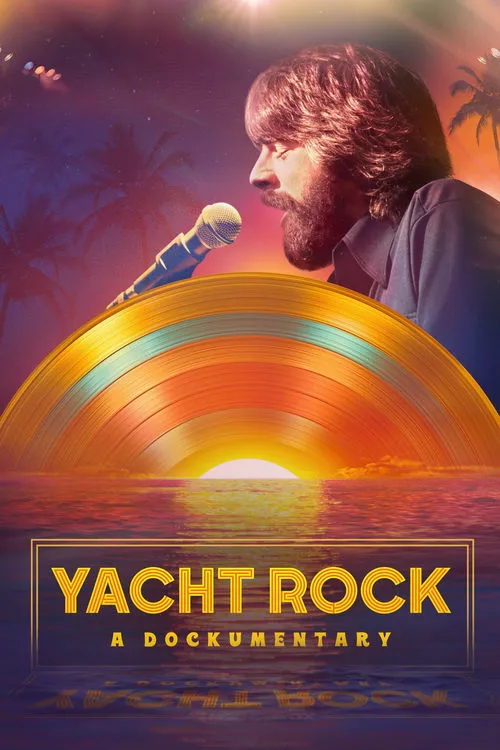Music Box: Yacht Rock: A DOCKumentary

Plot
In the tranquil realm of 1970s and 1980s music, the smooth, breezy sounds of soft rock reigned supreme. Dubbed "Yacht Rock" in retrospect, this genre embodied the free-spirited, laid-back culture of a bygone era. The term itself, coined by enthusiasts and critics alike, once implied a sense of snobbery and dismissal, casting these melodic masters as the epitome of bland, overplayed radio fare. Yet, this era's legacy has undergone a profound transformation, transcending initial skepticism to secure its place in the pantheon of musical excellence. At the heart of Yacht Rock lies a captivating convergence of musical talents, each bringing their unique voice and style to the table. Christopher Cross, with his soulful, baritone delivery and acoustic-driven melodies, epitomized the genre's introspective, emotional side. Michael McDonald, the charismatic lead vocalist of the Doobie Brothers, injected an unmistakable blend of soul and rock into his compositions, forging an indelible mark on Yacht Rock's sonic landscape. Kenny Loggins, with his signature falsetto and eclectic blend of folk, rock, and pop, served as the genre's most versatile songwriter. His songs effortlessly traversed the boundaries of genre, as seen in hits like "Footloose" and "Danger Zone." Steely Dan, the revered duo comprising Walter Becker and Donald Fagen, pushed the boundaries of Yacht Rock with their complex, jazz-infused arrangements and biting observational wit. Toto, the self-contained songwriting and performing unit, seamlessly merged progressive rock, pop, and R&B to create an unparalleled sonic palette. As the Yacht Rock phenomenon gained momentum, it attracted a devoted following of fans, who cherished the smooth, melodic sounds that wafted from their boomboxes, cassette tapes, and AM radios. These fans saw beyond the superficial criticisms levied against the genre, recognizing the genuine artistry and craftsmanship behind each composition. They celebrated the way Yacht Rock provided a sonic backdrop for relaxation, introspection, and carefree entertainment. In the late 1970s and early 1980s, the Yacht Rock movement reached its zenith, with hit singles and album releases dominating the charts. Cross's self-titled debut album (1980) became a massive success, featuring timeless tracks like "Sailing" and "Never Be the Same." McDonald's solo work, particularly his debut album, "If That's What It Takes" (1982), showcased his remarkable vocal range and songwriting prowess. Toto, with their breakthrough album "Toto IV" (1982), delivered an iconic blend of pop, rock, and jazz, yielding hits like "Africa" and "I Won't Hold You Back." However, as the 1980s progressed, a counter-trend emerged. The rising popularity of MTV and the growing influence of post-punk, new wave, and alternative rock led to a shift in musical tastes. Critics and fans began to scrutinize Yacht Rock, labelling it a relic of a bygone era, and criticizing its perceived commercialism and lack of edge. The genre's very nature, built around a focus on catchy melodies and smooth production, was deemed superficial and lacking in substance. As a result, many of the Yacht Rock artists faced a decline in their commercial fortunes and critical standing. Yet, despite the backlash, the core fan base of Yacht Rock enthusiasts refused to let their beloved music fade into obscurity. They continued to celebrate the genre, sharing their knowledge and passion with new generations of listeners. This dedication, combined with the cyclical nature of music trends, paved the way for Yacht Rock's eventual reappraisal. In recent years, the tide has turned, and the soft rock phenomenon has been reevaluated. Critics and historians have reassessed the genre, acknowledging its significant contributions to the development of progressive rock, soft rock, and adult contemporary music. The Yacht Rock movement has been repositioned within the broader historical context of 1970s and 1980s popular music, revealing its influence on a range of artists, from classic rock bands to contemporary singer-songwriters. The resurgence of Yacht Rock interest has been accompanied by a renewed appreciation for the era's sonic characteristics: lush instrumentation, catchy hooks, and intricate production. The genre's iconic artists, including Cross, McDonald, and Loggins, have seen a resurgence in popularity, with many fans discovering their music for the first time or revisiting timeless classics. The documentary, "Music Box: Yacht Rock: A DOCKumentary," serves as a testament to the enduring influence of this era's soft rock movement. By capturing the essence of Yacht Rock through a blend of archival footage, interviews, and live performances, the film not only celebrates the genre's musical achievements but also provides a poignant exploration of its cultural significance. As we navigate the ever-shifting landscape of contemporary music, the legacy of Yacht Rock stands as a reminder of the power of melody, creativity, and community in shaping our sonic experiences.
Reviews
Recommendations




